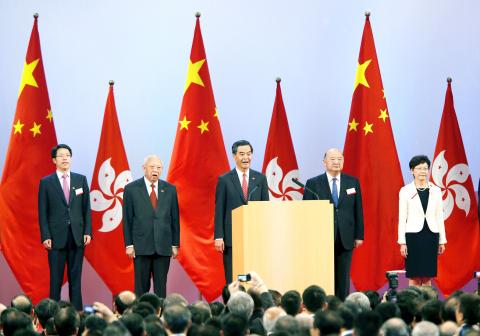Hong Kong Liaison Office Director Zhang Xiaoming (張曉明) has warned democracy campaigners in the former British colony against pushing for independence and confronting Beijing, Xinhua news agency reported.
Pro-democracy protesters in Hong Kong shut down major business districts for two-and-a-half months last year, with the “Umbrella movement” demanding open nominations in the next election of the territory’s chief executive in 2017.
Beijing has said it will allow a vote, but only for pre-screened candidates.

Photo: Reuters
In his most extensive comments since police cleared the protesters from the territory’s highways in mid-December, China’s top official in Hong Kong made it clear that Beijing is moving toward tighter control of the global financial hub.
“We could not allow any attempt to reject the central authority’s jurisdiction over Hong Kong under the pretext of a high degree of autonomy, to advocate ‘Hong Kong independence,’ or even to overtly confront with the central government through illegal ways,” Zhang said on Wednesday at a reception attended by top officials, according to Xinhua.
There is no mainstream independence movement in Hong Kong, although some activists want a continued campaign of civil disobedience this year to force Beijing to accept fully democratic elections.
Banners seeking to humiliate Hong Kong and Chinese leaders, including Chinese President Xi Jinping (習近平), festooned streets and government buildings during last year’s protests.
Democratic Legislative Council Legislator Emily Lau (劉惠卿) said Zhang’s comments were “improper and inappropriate” for a mainland official and blurred the boundaries between Hong Kong and China’s governance systems.
“It seems they want to interfere, they want to take the lead and it is very alarming,” Lau said.
Zhang on Wednesday said it was necessary to rethink the relationship between the two and that Hong Kong’s pro-democracy protests had proved its rule of law could be “fragile.”
Zhang also suggested Beijing could take a renewed interest in patriotic education, a touchy subject that sparked protests in Hong Kong in 2012.
“Priority should be given to the history, culture and national conditions of China in the education of the young people so that they could fully understand that the destiny and future of Hong Kong are closely connected to those of the motherland,” Zhang said, according to Xinhua.
About 4,000 people attended the reception where Zhang spoke, including Hong Kong Chief Executive Leung Chun-ying (梁振英), former Hong Kong chief executive Tung Chee-hwa (董建華), officials from state firms and foreign diplomats.

AGING: As of last month, people aged 65 or older accounted for 20.06 percent of the total population and the number of couples who got married fell by 18,685 from 2024 Taiwan has surpassed South Korea as the country least willing to have children, with an annual crude birthrate of 4.62 per 1,000 people, Ministry of the Interior data showed yesterday. The nation was previously ranked the second-lowest country in terms of total fertility rate, or the average number of children a woman has in her lifetime. However, South Korea’s fertility rate began to recover from 2023, with total fertility rate rising from 0.72 and estimated to reach 0.82 to 0.85 by last year, and the crude birthrate projected at 6.7 per 1,000 people. Japan’s crude birthrate was projected to fall below six,

Conflict with Taiwan could leave China with “massive economic disruption, catastrophic military losses, significant social unrest, and devastating sanctions,” a US think tank said in a report released on Monday. The German Marshall Fund released a report titled If China Attacks Taiwan: The Consequences for China of “Minor Conflict” and “Major War” Scenarios. The report details the “massive” economic, military, social and international costs to China in the event of a minor conflict or major war with Taiwan, estimating that the Chinese People’s Liberation Army (PLA) could sustain losses of more than half of its active-duty ground forces, including 100,000 troops. Understanding Chinese

SELF-DEFENSE: Tokyo has accelerated its spending goal and its defense minister said the nation needs to discuss whether it should develop nuclear-powered submarines China is ramping up objections to what it sees as Japan’s desire to acquire nuclear weapons, despite Tokyo’s longstanding renunciation of such arms, deepening another fissure in the two neighbors’ increasingly tense ties. In what appears to be a concerted effort, China’s foreign and defense ministries issued statements on Thursday condemning alleged remilitarism efforts by Tokyo. The remarks came as two of the country’s top think tanks jointly issued a 29-page report framing actions by “right-wing forces” in Japan as posing a “serious threat” to world peace. While that report did not define “right-wing forces,” the Chinese Ministry of Foreign Affairs was

US President Donald Trump in an interview with the New York Times published on Thursday said that “it’s up to” Chinese President Xi Jinping (習近平) what China does on Taiwan, but that he would be “very unhappy” with a change in the “status quo.” “He [Xi] considers it to be a part of China, and that’s up to him what he’s going to be doing, but I’ve expressed to him that I would be very unhappy if he did that, and I don’t think he’ll do that. I hope he doesn’t do that,” Trump said. Trump made the comments in the context